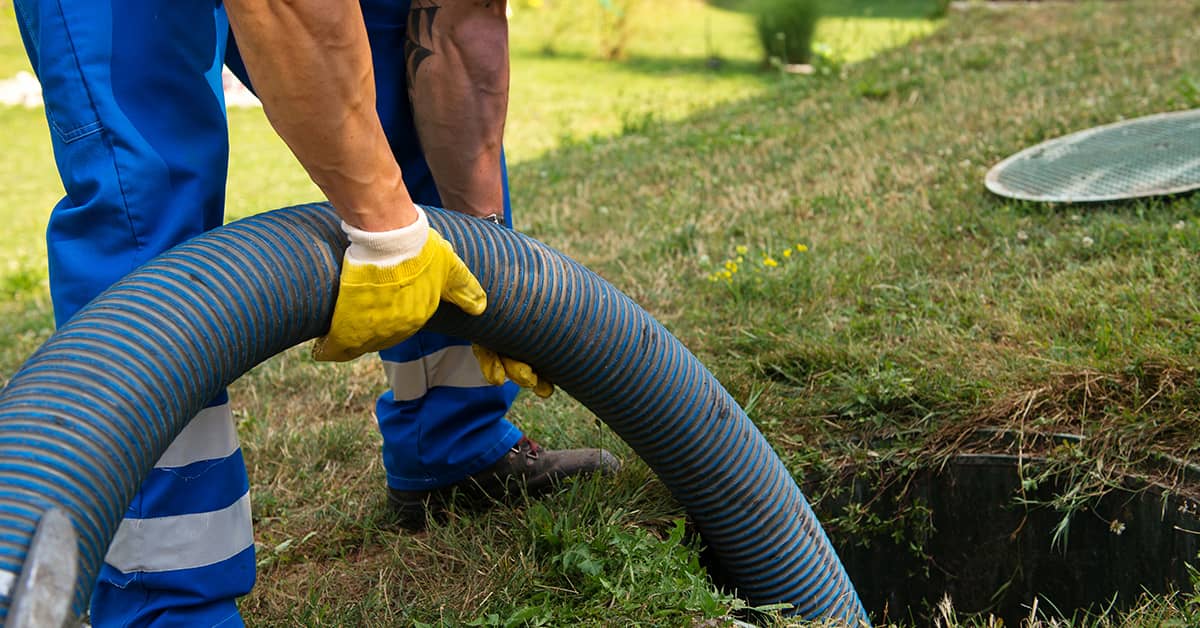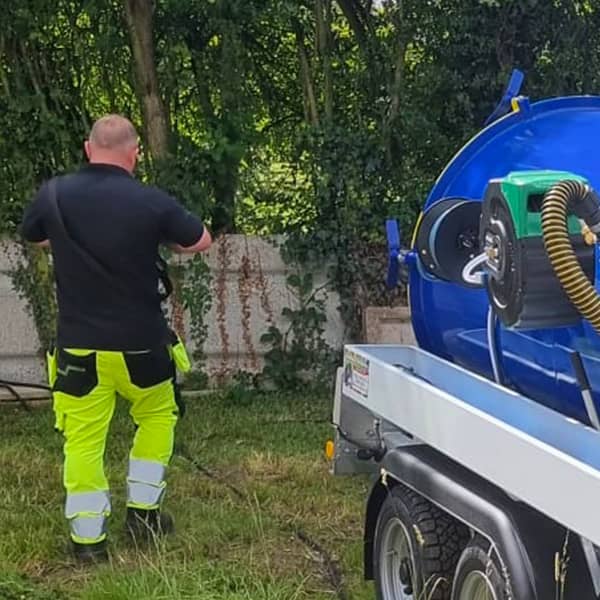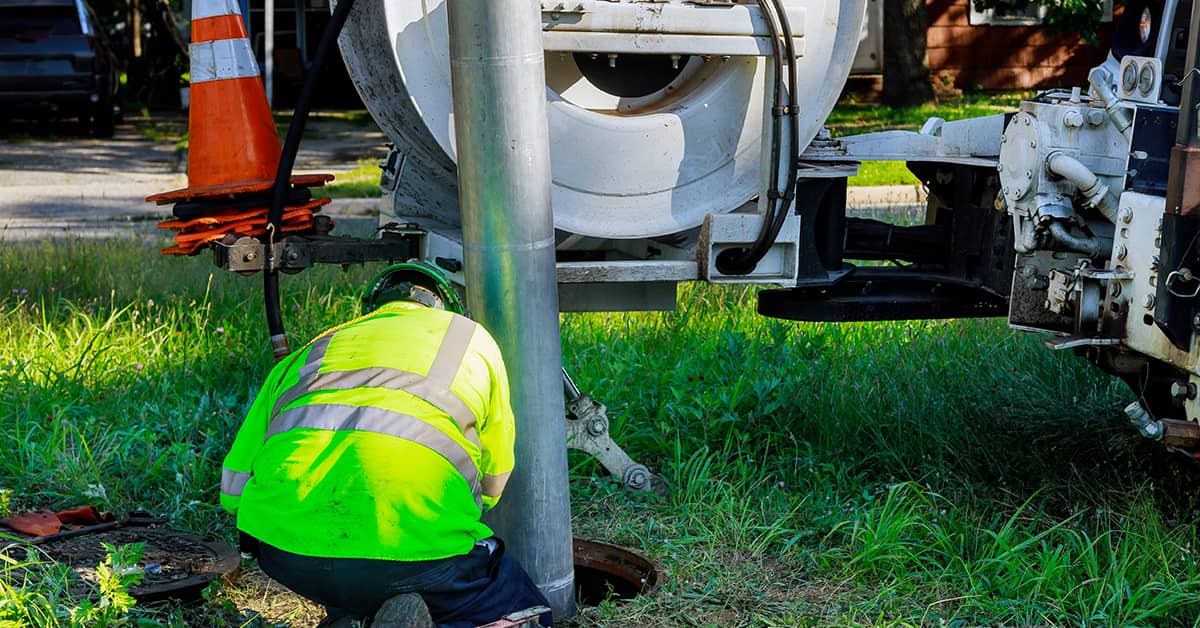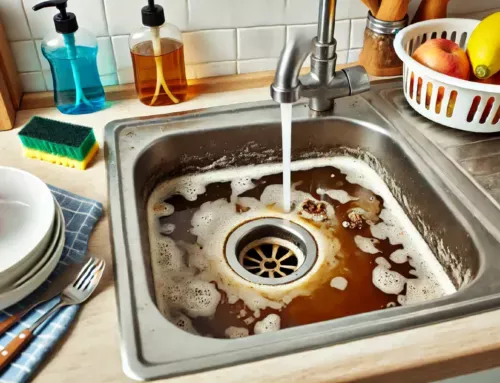Jump to…
- What is Septic Tank Emptying?
- Why is Septic Tank Emptying Important?
- How Often Should You Empty Your Septic Tank?
- Signs That Your Septic Tank Needs Emptying
- What is the Cost of Septic Tank Emptying?
- Don’t Delay! Get a No-Obligation Quote for Septic Tank Services from our local, friendly team
- Frequently Asked Questions
- Keep Your Septic System Running Smoothly
Experience the Unblockers Difference
No call-out charges
Emergency response call-outs available
Available anytime 24/7
Expert, local engineers
Fixed price, no hidden charges

Septic tank emptying is a crucial part of maintaining a functional and efficient septic system.
Regular maintenance prevents blockages, avoids costly repairs, and ensures your system operates smoothly.
In this comprehensive guide, you’ll learn everything you need to know about septic tank emptying, including when and how to do it, the costs involved, and how to find a reliable service provider.
What is Septic Tank Emptying?
Septic tank emptying is an essential maintenance task for properties that use a septic system for waste management.
Over time, as wastewater enters the septic tank, solid materials such as sludge (which settles at the bottom) and scum (which floats on the surface) accumulate.
These solids gradually reduce the tank’s capacity, potentially leading to blockages, overflows, and system failures if not regularly removed.
The primary purpose of septic tank emptying is to clear out these accumulated solids to ensure the septic system operates efficiently and effectively.
Without regular emptying, the build-up of sludge and scum can obstruct the tank’s ability to process wastewater, leading to unpleasant odours, slow drainage, and in severe cases, contamination of the surrounding environment.
The emptying process typically involves a professional service using a specialised vacuum tanker to pump out the tank’s contents.
Once emptied, the tank may be inspected for any signs of wear, damage, or other issues that could compromise its function.
Regular septic tank emptying is crucial to prevent costly repairs and maintain the overall health of your septic system.
Summary:
- Purpose: To remove accumulated sludge and scum from the septic tank.
- Function: Prevents system blockages, overflows, and environmental contamination.
- Process: Involves using a vacuum tanker to pump out the tank contents.
- Importance: Essential for maintaining septic system efficiency and preventing costly repairs.

Why is Septic Tank Emptying Important?
Regular septic tank emptying is crucial for maintaining the health and efficiency of your septic system.
Over time, solids such as sludge and scum accumulate in the tank, gradually reducing its capacity to process wastewater.
If these solids are not periodically removed, they can lead to blockages, which can cause sewage to back up into your home or overflow into your garden, leading to unpleasant and potentially hazardous conditions.
The benefits of septic tank emptying extend beyond just preventing blockages.
Regular maintenance helps you avoid costly repairs by identifying potential issues before they become serious problems.
For instance, when a tank is emptied, professionals can inspect the system for signs of wear and tear, such as cracks or leaks, allowing for early intervention that can save you money in the long run.
A well-maintained septic tank runs more efficiently.
When a tank is free from excess sludge and scum, it can process incoming wastewater more effectively, ensuring that your system operates smoothly and without interruption.
This efficiency also extends the lifespan of your septic system, providing long-term savings and peace of mind.
In summary, the importance of septic tank emptying cannot be overstated.
It is a critical component of septic system maintenance, ensuring that your system remains functional, efficient, and free from costly repairs.
- Blockage Buster: Regular emptying prevents nasty blockages and backups.
- Cost Saver: Avoids expensive repairs by catching issues early.
- Efficiency Boost: Keeps your septic system running smoothly and efficiently.
- Longevity: Prolongs the life of your entire septic system.
How Often Should You Empty Your Septic Tank?
The frequency at which you should empty your septic tank depends on several factors, each influencing how quickly solids build up and reduce the tank’s efficiency.
Generally, septic tanks need to be emptied every 3 to 5 years, but this can vary based on the following considerations:
- Tank Size: Larger tanks can hold more waste, meaning they may not need to be emptied as often as smaller tanks.
- However, if a large tank is used by a small household, it might take longer to fill up, extending the time between pumpings.
- Household Size: The number of people living in your home directly impacts how quickly your septic tank fills up.
- More occupants generate more wastewater, increasing the rate at which solids accumulate in the tank.
- Water Usage: High water usage can cause the tank to fill up more quickly.
- Households that use more water, whether due to frequent laundry, long showers, or running dishwashers daily, may need to empty their septic tank more often.
- System Age and Condition: Older systems or those in less-than-perfect condition may require more frequent maintenance, including more regular emptying, to keep everything running smoothly.
Maintaining a regular septic tank schedule based on these factors is crucial to prevent overflows, backups, and costly repairs.
By monitoring your tank and adjusting the emptying frequency as needed, you can ensure your septic system remains efficient and reliable.
- Size Matters: Larger tanks may need emptying less often.
- People Power: More occupants = more frequent emptying.
- Water Watch: High water use means quicker fill-ups.
- Stay on Schedule: Regular checks keep your system efficient and trouble-free.

Signs That Your Septic Tank Needs Emptying
Recognising the signs that your septic tank is full and needs emptying is crucial to avoiding unpleasant and costly issues. Several indicators can alert you that it’s time to pump your tank:
- Slow Drains: One of the most common signs of a full septic tank is slow drainage in sinks, showers, and toilets.
- When the tank is nearing capacity, it struggles to accommodate more wastewater, causing the drainage process to slow down significantly.
- Foul Odors: A strong, unpleasant smell coming from your drains or around the area where your septic tank is located is a clear indication that the tank is full.
- This odour, often described as rotten eggs or sewage, occurs when waste begins to back up into the plumbing system.
- Pooling Water: If you notice standing water or unusually soggy patches in your yard, particularly around the drain field, it’s a sign that your septic tank might be overflowing.
- This pooling occurs when the tank can no longer hold the wastewater, causing it to rise to the surface.
- Sewage Backups: The most severe sign that your septic tank needs emptying is sewage backing up into your home.
- This can happen in toilets, sinks, and bathtubs and requires immediate attention to prevent extensive damage and health hazards.
These warning signs are vital to monitor as they indicate that your septic tank is due for emptying.
Addressing these issues promptly can prevent system failures, costly repairs, and potential environmental hazards.
- Slow Drains: Watch for sluggish sinks and showers.
- Bad Smells: Foul odours are a clear red flag.
- Water Woes: Pooling water signals trouble below.
- Backup Alert: Sewage backups need urgent attention.
What is the Cost of Septic Tank Emptying?
The cost of septic tank emptying can vary widely depending on several factors, but on average, you can expect to pay between £250 and £400 in the UK.
Understanding what influences these costs can help you budget for this essential maintenance task.
- Tank Size: Larger tanks hold more waste and therefore require more time and resources to empty, leading to higher costs.
- A typical household septic tank is around 1,000 to 2,500 gallons, but larger systems will incur additional fees.
- Location: The location of your property plays a significant role in the cost.
- If your septic tank is in a remote area or difficult to access, this could increase the service cost.
- Additionally, areas with higher living costs may see higher service fees.
- Service Provider: Different companies may charge varying rates for septic tank emptying.
- Some may offer package deals that include inspections and minor repairs, while others might charge extra for these services.
- It’s essential to compare quotes from several providers to get the best value.
- Frequency of Service: Regular maintenance can sometimes reduce costs, as service providers might offer discounts for scheduled services.
- Conversely, if a tank hasn’t been emptied for a long time, the job could be more challenging and expensive.
While these factors can influence the overall price, regular septic tank maintenance, including timely emptying, can prevent more expensive repairs and system failures in the future.
- Size Matters: Bigger tanks cost more to empty.
- Location Impact: Remote or hard-to-reach tanks can increase costs.
- Shop Around: Different providers offer different rates—compare to save.
- Regular Savings: Frequent maintenance can sometimes lead to discounts.
Frequently Asked Questions
Conclusion
Professional septic tank cleaning is an essential service for maintaining the health, efficiency, and longevity of your septic system.
Throughout this guide, we have explored the many benefits of engaging professional services, highlighting how they ensure thorough and safe cleaning, proper waste disposal, and compliance with environmental regulations.
Unlike DIY efforts, which carry risks of incomplete cleaning and potential legal issues, professional septic tank cleaning offers peace of mind by ensuring that every aspect of the process is handled by trained experts.
By opting for professional cleaning, you can avoid the pitfalls associated with neglecting your septic system.
Regular cleaning prevents blockages, system overflows, and costly repairs that can arise from sludge and scum build-up.
Professionals not only remove waste but also inspect your system for any signs of wear or damage, addressing small issues before they escalate into significant problems.
This proactive approach is crucial for extending the life of your septic system, saving you money in the long run.
Professional services are equipped with specialised tools and technology to efficiently handle the task, regardless of the size or condition of your septic tank.
They follow strict safety and environmental protocols, ensuring that waste is disposed of responsibly and that your property remains clean and hazard-free.
In summary, investing in professional septic tank cleaning is a wise decision for any homeowner.
It not only protects your property and the environment but also provides you with the assurance that your septic system is in expert hands.
Regular professional cleaning is the cornerstone of effective septic system maintenance, helping you avoid emergencies and ensuring that your system operates smoothly for years to come.
If you haven’t already scheduled your next service, now is the time to contact us and keep your septic system in optimal condition.
Related Articles
READY TO MAKE YOUR ENQUIRY?
Get a quote for a drainage callout
Get a quote for a drainage callout
We have drainage engineers in your area now offering availability today.
Just leave a few details and our friendly drainage service team will call you right back.
We have drainage engineers in your area now offering availability today.
Just leave a few details and our friendly drainage service team will call you right back.
"*" indicates required fields

Need to speak to us right away? We have local engineers available now. Call 0808 303 0050
“Outstanding Service & Fast Repair”





